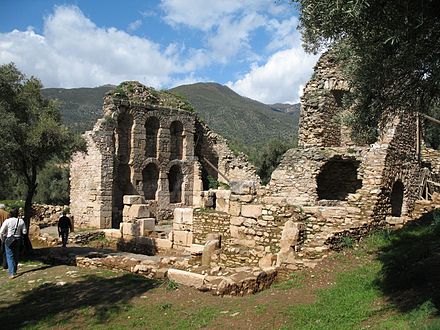The earliest details of Nagara are to be found in Ptolemy’s ‘Geōgraphikḕ Hyphḗgēsis’, locating it to be in ‘India intra Gangem’ or ‘India within the Ganges’ and calls it ‘Dionysopolis’.
The invincible Macedonian ruler Alexander III, when in 326 BCE he invaded the northwestern boundaries of India (beyond the Indus), became one of the earliest Hellenic kings to have travelled this far into the East.
After having subjugated the mighty Achaemenid Empire of Persia, Alexander is said to have led his force to annex the territories that came under the Persian rule. This motivated him to launch a couple of campaigns into the northwestern territories of the peninsular subcontinent, which formed the easternmost kingdoms that owed allegiance to the then vanquished Achaemenids.
Even though the Macedonian king seemed to sport youthful brevity and an enticement for war, a kingdom that could escape the wrath of the impenetrable Macedonian phalanx was one Nyssa (also known as Nysa or Nagara). There exists two central causes attributed to this.
Alexander, on his own part, possessed a massive deal of veneration towards the Greek Gods of Olympus. He had spent half of his life learning about the Olympians and their prowess, the legendary heroes of the Greek mythology and found an urge within himself to rise up to Olympus after his death (similar to the Greek hero Heracles). Initially after ascending the Macedonian throne, he proclaimed himself to be a descendant of Achilles, the Greek hero in the Trojan war, and after his victory over King Darius, he began identifying himself as the son of the omnipotent ruler of the Skies, Zeus.
The earliest details of Nagara are to be found in Ptolemy’s ‘Geōgraphikḕ Hyphḗgēsis’, who locates it to be in ‘India intra Gangem’ or ‘India within the Ganges’ and calls it ‘Dionysopolis’. Furthermore, Greek military commander and historian, Arrian of Nicomedia, in his work entitled, ‘Anabasis of Alexander’ details us on why this city had been spared like none other.
Amongst the inestimable Olympians that rule the various natural forces, planets and emotions in the entire ethereal universe, one is Dionysus (Roman: Bacchus), the Greek god of wine, fertility and ecstasy. His cult (the cult of Dionysus) is widely associated with the Orphic cult, the latter having been found by Orpheus, a famed musician and former Argonaut.
Revered as the son of Zeus and Semele (Princess of Thebes), Dionysus is generally considered to be an alienated Olympian. In her book, ‘The God Who Comes: Dionysian Mysteries Revisited’, Rosemarie Taylor-Perry considers Dionysus’ foreignness as an essential characteristic of the Dionysian cult.
During his infancy (owing to the fact that he was a son of Zeus and a mortal), Dionysus is said to have acquired the jealousy of Hera, the Queen of the Greek Pantheon. She struck the god with madness and made him travel to various parts of the world, seemingly as a consequence of Zeus’ innumerable illegitimate affairs with goddesses, women and nymphs.
Legends say that it was in Phrygia where he was cured of this craziness by Rhea, one who taught him various rituals before leaving him on a trip to Asia.
A significant part of Dionysus’ growth is concentrated in Asia, where he wandered from one country to the other, teaching its people the cultivation and culture of vine.
Most crucial among these trips of his, is one to Nyssa, a spectacular city that once stood between the Kabul River and the Indus. Dionysus is said to have resided many a year there and is also credited with having organised the entire city to the form Alexander saw later. Having been informed of the city’s classical glory and its sacredness, the Macedonians decided not to invade it, lest Dionysus be enraged.
As for the Greek God himself, Diodorus Siculus opinionated that, Dionysus’ travels soon took the form of a military expedition as he forged himself to conquer the entire world, except for Ethiopia and Britain.
The first of Dionysus’ attachment to Nyssa (Nysa?) is not however his ultimate. The god’s infancy is shred in mysteries. Various accounts have given discrete descriptions regarding the period Dionysus was being brought up. In his work, ‘Histories’, Herodotus says that Dionysus was raised hidden in Zeus’ thigh until he was brought to one Mount Nysa in Ethiopa, to be trained by the Hyades (rain nymphs who were made a cluster of stars as a reward from Zeus) and it was much later (after his return to the West), that the Greeks recognised him to be a God. Nagara, having actually been a city of the maenads, had possibilities of having had a wide cross cultural discourse and mercantile interaction, since the residents were as much Asians as they revered a Greek God and lived the Olympian way.
Presently however, nothing much is known about this Graeco-Indian city except for a few literary sources as noted down by Arrian and Ptolemy and some archaeological remains dating back to the Kushan-Hephthalite period, 1st-6th century AD. Today, the location of Nyssa (renamed Nagara Ghundi), as identified by the Cultural Property Training Resource of Afghanistan is ‘approximately four kilometres west of Jalalabad near Tepe Khwaja Lahori, south of the junction of the Surkhäb and Kabul rivers.’
Warwick Ball, in his ‘Archaeological Gazetteer of Afghanistan’ has penned down a bit about the archaeological findings from the excavations that had been carried out. He mentions about ‘a very large stupa’, almost a ‘100 meters in circumference.’ ‘Excavations revealed an unusual radial construction of the dome, and a decorated, plastered exterior. Possibly identifiable with the Nagarahara stupa described by the 7th century Chinese pilgrim and chronicler Xuanzang.’
Howbeit, to the maenads, Nagara was not simply a city. It resembled the dynamic interaction of the sophisticated western philosophy and culture with the unrestrained eastern spirit of liberty and ecstasy, something that combined to give birth to the philosophy of Dionysus, the first Graeco-Indian Olympian.
Writer is a Fellow of the Royal Asiatic Society of London

